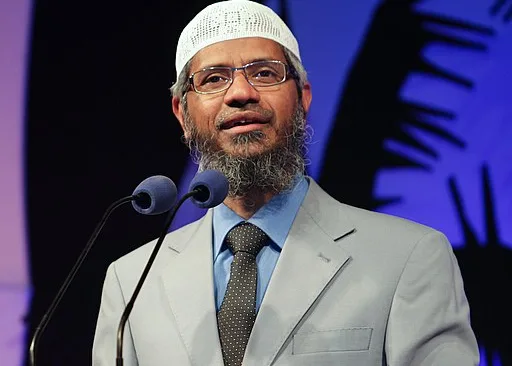The fugitive preacher wanted in India for alleged extremism, discusses educational contributions with the Pakistani leader
In a significant and contentious meeting, fugitive Islamic preacher Zakir Naik sat down with Pakistan’s Prime Minister Shehbaz Sharif, igniting discussions around national security and religious influence. Naik, who has been living in Malaysia since fleeing India in 2016, is a polarising figure due to his alleged extremist activities and his desire to engage with educational institutions in Pakistan. This encounter could have far-reaching implications for India-Pakistan relations and internal security in India.
The meeting took place in Islamabad, where Naik conveyed his intentions to contribute positively to Pakistan’s educational sector. His aim, as stated during the discussions, is to establish institutions that align with Islamic values and promote religious education. This initiative has drawn criticism, particularly from India, where Naik faces serious charges, including inciting violence and spreading communal hatred.
Naik’s legal troubles began in 2016 when he was accused of making inflammatory speeches that allegedly incited young Muslims to radicalise and commit violence. Following these accusations, he left India and sought refuge in Malaysia, where he has since built a substantial following through his online lectures and social media presence. His return to public discourse has been marked by controversy, especially given the serious allegations levied against him by Indian authorities.
Embed from Getty ImagesThe recent meeting with Prime Minister Sharif has rekindled discussions about the Pakistani government’s stance on individuals accused of extremism. Critics argue that Naik’s presence in Pakistan, coupled with his recent interactions with political leaders, signals an endorsement of his ideology, which many consider harmful. Observers note that this meeting could embolden other individuals with similar views, potentially destabilising the already delicate social fabric in the region.
During the meeting, Prime Minister Sharif welcomed Naik’s proposals and expressed a keen interest in enhancing educational initiatives within Pakistan. He highlighted the importance of addressing educational deficiencies in the country, which is often seen as a breeding ground for extremism. However, by engaging with Naik, Sharif risks alienating more moderate factions within Pakistan that oppose extremist ideologies and the influence of controversial figures.
This engagement has raised eyebrows not only in India but also among international observers who closely monitor Pakistan’s approach to religious extremism. Many worry that such meetings can legitimise figures like Naik, potentially allowing them to further spread their ideologies under the guise of education and religious discourse.
In India, the response has been swift and critical. Officials have condemned the meeting, viewing it as a blatant disregard for India’s concerns regarding national security. The Indian Ministry of External Affairs stated that the meeting poses a serious threat to regional stability and should be condemned by the global community. Analysts point out that Naik’s activities and his meeting with Sharif could serve to embolden extremist elements within India, especially among youth who may be susceptible to radical ideologies.
Moreover, Naik’s extensive use of social media has allowed him to maintain a strong influence even while living abroad. His online sermons continue to attract significant viewership, which raises further concerns regarding his ability to spread extremist narratives beyond the borders of Pakistan and Malaysia. This situation underscores the complexities of managing narratives in a digital age where information can be disseminated rapidly and widely.
Pakistan’s government faces a difficult balancing act. While it seeks to improve its educational infrastructure, it must also contend with the implications of associating with controversial figures. This meeting has drawn criticism not only from India but also from within Pakistan, where some see it as a step backwards in the fight against extremism.
As the political landscape evolves, the ramifications of this meeting could reverberate throughout South Asia. Naik’s ambitions to contribute to education in Pakistan, while contentious, reflect broader issues regarding the intersection of religion, politics, and education in the region. The necessity of fostering a safe and secure environment for all citizens remains paramount, and the influence of figures like Naik complicates this mission.
The fallout from this meeting may continue to unfold, and it remains to be seen how it will impact India-Pakistan relations moving forward. As both nations grapple with their challenges regarding extremism and national identity, the implications of Naik’s re-emergence into the political discourse cannot be underestimated.
